
Journal of Healthcare Quality Research
Scope & Guideline
Fostering global conversations on healthcare quality.
Introduction
Aims and Scopes
- Healthcare Quality Improvement:
The journal emphasizes research that explores strategies for improving healthcare quality, including quality management systems, patient safety initiatives, and the implementation of best practice guidelines. - Patient-Centered Care:
A significant focus is placed on understanding patient experiences, preferences, and reported outcomes, ensuring that healthcare services are aligned with the needs and values of patients. - Interprofessional Collaboration:
Research often addresses the importance of teamwork and collaboration among healthcare professionals, aiming to enhance service delivery and patient outcomes through effective communication and shared responsibilities. - Health Policy and Management:
The journal explores the impact of health policies, economic factors, and management strategies on healthcare quality, aiming to inform decision-makers about best practices and potential improvements. - Innovative Health Technologies:
There is a growing interest in the application of new technologies, such as telemedicine and artificial intelligence, to improve healthcare services, enhance patient engagement, and streamline processes.
Trending and Emerging
- Impact of COVID-19 on Healthcare Quality:
Studies examining the effects of the COVID-19 pandemic on healthcare delivery, patient safety, and quality of care have surged, reflecting the need to understand and improve responses to global health crises. - Digital Health Innovations:
Research on the implementation and effectiveness of digital health technologies, including telemedicine and artificial intelligence, is on the rise, emphasizing their role in enhancing healthcare quality and accessibility. - Patient Engagement and Experience:
There is a growing emphasis on understanding and improving patient engagement and experience, with studies focusing on patient-reported outcomes, shared decision-making, and the importance of patient perspectives in quality improvement. - Social Determinants of Health:
Increased attention is being given to how social factors influence healthcare access and outcomes, indicating a trend towards addressing health equity and the social determinants that impact patient care. - Integrated Care Models:
Research exploring integrated care approaches that combine various healthcare services and professionals to provide comprehensive care is gaining traction, reflecting a shift towards holistic and patient-centered healthcare delivery.
Declining or Waning
- Traditional Risk Management Approaches:
Research focusing solely on traditional risk management strategies has decreased, possibly due to the increased emphasis on proactive and integrated approaches to patient safety and quality improvement. - In-Person Patient Education:
There has been a noticeable reduction in studies centered around traditional in-person patient education methods, as healthcare systems increasingly adopt digital platforms and telehealth for patient engagement. - Generalized Quality Indicators:
The frequency of articles discussing broad, generalized quality indicators has waned, suggesting a shift towards more specific, context-driven quality metrics that address particular health conditions or populations. - Single-Disciplinary Research:
Research that examines healthcare quality solely from a single-disciplinary lens is declining, as interdisciplinary approaches that integrate insights from various fields gain traction. - Reactive Patient Safety Reporting:
The focus on reactive approaches to patient safety reporting appears to be diminishing, with more research now aimed at proactive strategies that prevent adverse events before they occur.
Similar Journals
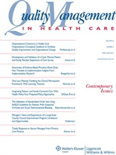
Quality Management in Health Care
Transforming healthcare through excellence in management.Quality Management in Health Care is a revered peer-reviewed journal published by Lippincott Williams & Wilkins, dedicated to advancing the understanding and implementation of quality management principles within the healthcare sector. With an ISSN of 1063-8628 and E-ISSN 1550-5154, this journal has established its reputation through the dissemination of rigorous research and innovative practices that address critical issues in care planning, health policy, and leadership management. The journal is ranked in the Q3 quartile across multiple categories, including Care Planning and Health Policy, demonstrating its significance in the evolving landscape of health management. Although it does not currently offer Open Access options, its blend of theoretical and practical insights makes it an essential resource for researchers, healthcare professionals, and students keen on enhancing quality and effectiveness in health services. This journal continues to play a vital role in shaping best practices and fostering a culture of quality excellence in healthcare, aligning with its objective to refine organizational practices and improve patient outcomes.
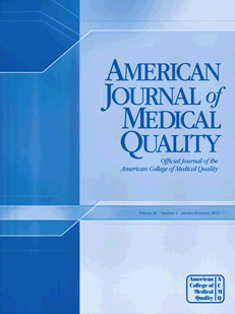
AMERICAN JOURNAL OF MEDICAL QUALITY
Advancing Excellence in Healthcare Policy and PracticeAmerican Journal of Medical Quality is a pivotal publication in the field of healthcare quality and medical policy, published by Lippincott Williams & Wilkins. Since its inception in 1992, the journal has become a critical resource for researchers, practitioners, and students dedicated to improving patient care and health systems through evidence-based practices. With a current impact factor that reflects its significance in the arena of medicine and health policy, the journal falls within the Q3 category in both Health Policy and Medicine (Miscellaneous) as of 2023, ranking 253rd out of 636 in general medicine according to Scopus metrics. This underscores its relevance and prominence among peers. The journal's scope encompasses a diverse range of topics related to quality improvement initiatives, healthcare delivery systems, and policy analysis, making it an essential read for anyone invested in advancing medical quality standards and practices. While it is not an open-access journal, the content is meticulously curated to enrich the academic discourse and inform best practices in medical quality. With an ongoing commitment to addressing contemporary challenges in healthcare, American Journal of Medical Quality serves as an influential platform for advancing the knowledge and implementation of quality initiatives in medical settings.
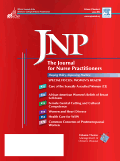
JNP- The Journal for Nurse Practitioners
Fostering Professional Growth in Advanced Nursing.JNP - The Journal for Nurse Practitioners is a leading publication in the fields of Advanced and Specialized Nursing, as well as Fundamentals and Skills, proudly published by Elsevier Science Inc. With an ISSN of 1555-4155 and an E-ISSN of 1878-058X, this journal provides a robust platform for disseminating innovative research and clinical insights relevant to nurse practitioners. With a respectable 2023 Scopus ranking placing it in the Q2 category for several key nursing disciplines, JNP serves as an essential resource for professionals seeking to stay at the forefront of nursing practice. The journal spans over a decade of impactful scholarship, converging years from 2005 to 2024, encouraging the advancement of knowledge and skills within the nursing community. Although currently not an open-access publication, it remains pivotal for researchers and practitioners dedicated to improving patient care and advocating for the nursing profession.
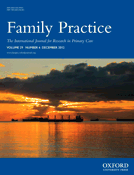
FAMILY PRACTICE
Exploring evidence-based solutions for better health outcomes.FAMILY PRACTICE is a premier peer-reviewed journal dedicated to advancing the field of family medicine, published by Oxford University Press. Established in 1984 and continuing its influential discourse into 2024, the journal holds an esteemed position in the academic community, as evidenced by its classification in the Q1 quartile for Family Practice, ranking 10th out of 56 in this category according to Scopus. With an impressive impact factor and a commitment to disseminating high-quality research, FAMILY PRACTICE serves as an essential resource for researchers, clinicians, and students alike, striving to enhance practice and education in family medicine through evidence-based insights and innovative practices. While the journal maintains a traditional subscription model, it supports broad dissemination of knowledge that contributes significantly to the evolving landscape of healthcare in the United Kingdom and beyond.

Journal of Patient Experience
Understanding experiences to improve healthcare delivery.Journal of Patient Experience, published by SAGE Publications Inc, serves as a vital resource in the realms of Health Policy, Health (Social Science), and Leadership and Management. This open-access journal, established in 2014, is dedicated to enhancing the understanding of patient experiences and its implications on healthcare delivery and outcomes. With an impressive impact factor indicative of its scholarly significance and a current category quartile ranking of Q2 across multiple disciplines, it plays a crucial role in disseminating innovative research that informs policy and practice. The journal is indexed in Scopus, further affirming its contributions within the social sciences and healthcare sectors. It aims to foster interdisciplinary collaboration among researchers, healthcare professionals, and students, driving the conversation toward meaningful improvements in patient care. Its continued commitment to excellence makes it an essential read for anyone invested in the future of healthcare.
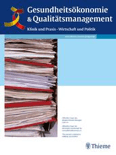
Gesundheitsoekonomie und Qualitaetsmanagement
Navigating the Complexities of Healthcare EconomicsGesundheitsoekonomie und Qualitaetsmanagement, published by THIEME MEDICAL PUBL INC, serves as a vital resource in the field of health policy, particularly within the context of Germany. Since its inception in 1999, this journal has been committed to advancing the discourse on health economics and quality management, making significant contributions to understanding the complexities of healthcare systems. With an impact factor that reflects its ongoing importance, the journal is categorized in the Q4 quartile for Health Policy as of 2023, indicating its role in serving a niche yet crucial space in medical literature. Although currently not an open access journal, it remains accessible through various academic platforms, making its content available to a diverse audience of researchers, healthcare professionals, and students eager to engage with contemporary issues in health economics. With its publication continuing through 2024, Gesundheitsoekonomie und Qualitaetsmanagement is essential for anyone looking to deepen their understanding of the economic aspects of healthcare and ensure quality management in health services.
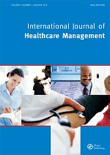
International Journal of Healthcare Management
Advancing healthcare management through innovative research.The International Journal of Healthcare Management, published by ROUTLEDGE JOURNALS, TAYLOR & FRANCIS LTD, stands as a crucial platform for the dissemination of innovative research and insights in the realm of healthcare management. With a focus on health policy, leadership, and management, this journal aims to bridge the gap between theory and practice, providing a valuable resource for researchers, professionals, and students alike. It boasts an impressive Q2 ranking in Leadership and Management and a Q3 ranking in Health Policy for 2023, highlighting its influence and relevance within the academic community. With an accessible ISSN of 2047-9700 and E-ISSN of 2047-9719, the journal features an array of peer-reviewed articles that promote the advancement of knowledge and best practices in healthcare settings. While currently not offered as open access, the journal publishes high-quality research that underscores the importance of effective management strategies in enhancing healthcare outcomes. Positioned in the United Kingdom, the journal continues to contribute significant knowledge and frameworks that guide healthcare leaders and policymakers in navigating the complexities of governance in health services.
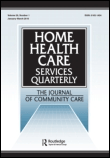
HOME HEALTH CARE SERVICES QUARTERLY
Empowering Innovation in Community CareHOME HEALTH CARE SERVICES QUARTERLY, an esteemed publication by Taylor & Francis Ltd, has been a cornerstone of scholarly discourse in the fields of community and home care since its inception in 1979. With ISSN 0162-1424 and E-ISSN 1545-0856, this quarterly journal promotes rigorous research and innovative practices in home health care services, significantly impacting health policy and public health discussions. The journal enjoys a respectable Impact Factor, reflecting its contributions to the field, and currently ranks Q2 in Community and Home Care, along with Q3 status in both Health Policy and Public Health. Researchers, professionals, and students alike can benefit from the diverse range of articles that address practical challenges and emerging trends within the home health care industry. Although not an open-access journal, it continues to provide a vital platform for advancing knowledge and disseminating best practices essential for improving health outcomes. As it embarks on its journey towards 2024, it remains committed to fostering an inclusive dialogue that shapes the future of home health care.
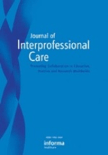
Journal of Interprofessional Care
Bridging disciplines to enhance patient outcomes.The Journal of Interprofessional Care, published in the United Kingdom, is a premier scholarly outlet dedicated to advancing the field of interprofessional collaboration and healthcare delivery. With a notable impact factor signifying its relevance and influence, this journal holds a distinguished position in the Q1 category of Medicine, ranking #77 out of 636 in the broader field of General Medicine according to Scopus. Since its inaugural publication in 1986, it has served as a vital platform for researchers, practitioners, and students who seek to explore the synergies among various healthcare disciplines, ultimately aiming to improve patient outcomes and care integration. The journal’s rigorous peer-review process ensures high-quality contributions that enhance our understanding of collaborative practices in healthcare. Though currently not an open-access journal, it continues to provide a wealth of knowledge for those invested in interprofessional education and practice.
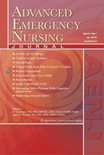
Advanced Emergency Nursing Journal
Transforming Emergency Care Through Research and InnovationAdvanced Emergency Nursing Journal, published by Lippincott Williams & Wilkins, stands as a key resource within the domains of Emergency Medicine and Emergency Nursing. With a commitment to advancing the field, this journal provides a platform for rigorous research, critical reviews, and innovative practices aimed at enhancing patient care in emergency settings. Though it holds a Q3 ranking in both related categories as per the 2023 metrics, its global reach spans various aspects of emergency care, promising insights that are crucial for both professionals and academics alike. Covering topics from clinical procedures to policy analysis, the journal invites submissions that aim to bridge theory and practice, highlighting the importance of evidence-based approaches in emergency nursing. Researchers, educators, and healthcare practitioners can Find more information and explore their own contributions in a dynamic environment that continuously evolves with the field. Whether you're seeking to stay current with the latest advancements or to publish your findings, this journal is an essential asset for those dedicated to improving care in urgent medical situations.